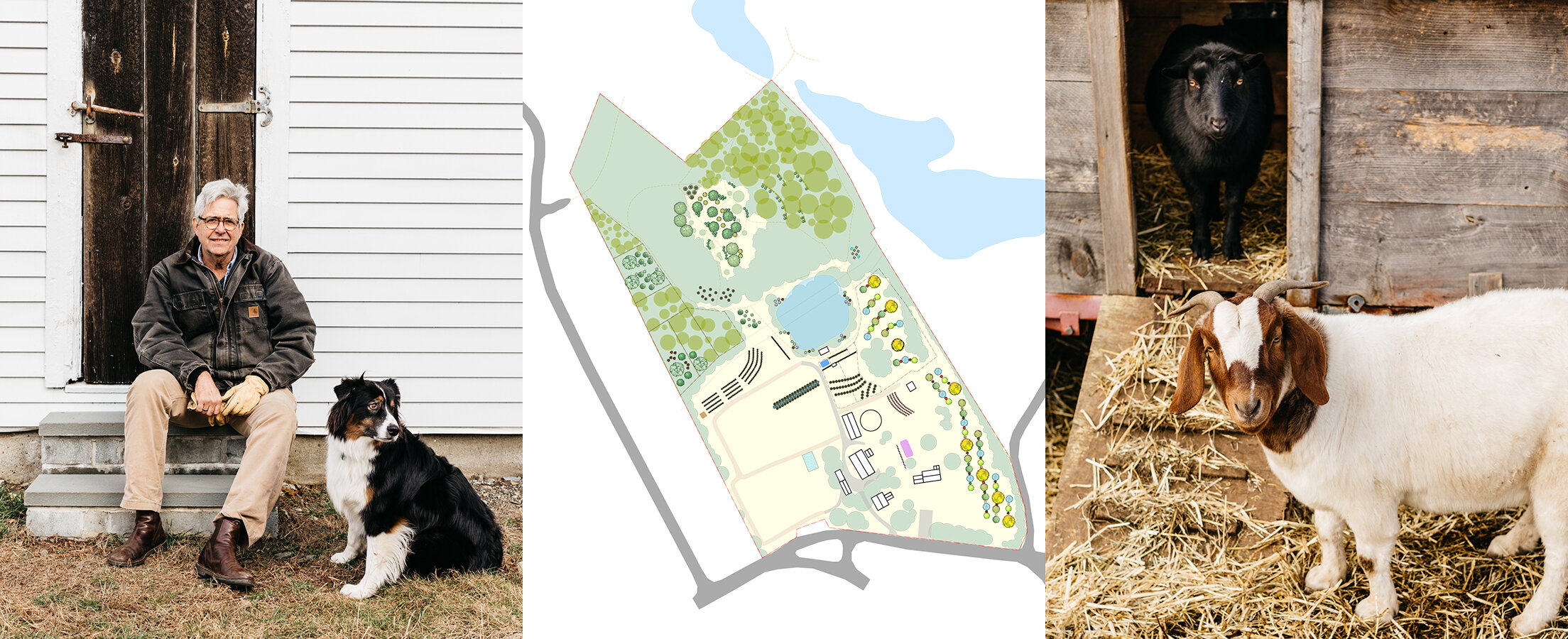Edible Food Finds: Wright-Locke Farm
Photos by Michael Piazza
On a crisp and cloudy day this fall the last remaining farm in Winchester held its annual party for volunteers. At the farm stand Ina Baird, 11, who has been a part of the “Small People’s Crew” since she was 4 years old, sold vegetables, honey and coffee to those stopping by to feed the goats or use one of the many hiking trails on the grounds. In the 1827 Barn, so named for the date it was built, Hank the Australian Shepherd opportunistically weaved through the legs of volunteers of all ages as they enjoyed wine, cheese and hot cider. Kim Kneeland, the farm’s community engagement and development manager, told folks about her wedding the previous weekend, and the rehearsal dinner that was held in that very space.
It was a scene full of warmth and community that almost wasn’t possible.
In 2007 Wright-Locke Farm was nearly purchased by a developer with a proposal to build 300 residential units on site. The town stepped in, purchasing the land and establishing the Wright-Locke Conservancy. In 2013, Archie McIntyre, who began as a volunteer, was appointed executive director and has helped steer the farm from primarily a raspberry-picking locale to a rich community resource. Today Wright-Locke grows organic fruits, vegetables and flowers; offers farm-based educational programs; hosts public and private events; and practices environmentally sound growing methods.
One of those methods is agroforestry. Agroforestry is a system of land management in which trees and shrubs are grown amid pastureland, which increases biodiversity and reduces erosion. “At Wright-Locke,” said McIntyre, “it includes adding bioswales to reduce nutrient runoff, adding fodder strips to provide food for our goats while providing a wind block to prevent soil erosion, creating a silvopasture area for our goats to graze in the woods, and planting a fruit orchard.” This approach is part of the farm’s mission to provide sustainable agriculture and land stewardship. As much as Wright-Locke is a throwback, a farm in the midst of a thriving suburb, keeping an eye toward the future is something they consider a responsibility.
“I love to think of our farm as a ‘gateway farm,’” said Kneeland. “It brings people in and then they feel more excited and comfortable getting involved and learning about other spheres they were less familiar with. We slowly flood our community with more knowledge about the food they eat, how farming works, how to cook and how to work with the land in a sustainable manner.” This might mean volunteering in the fields, attending a lecture or even taking a “forest bathing” workshop. It is through small-scale engagement that Wright-Locke hopes to inspire large-scale change, and through environmental leadership by example. To this end, Wright-Locke is installing solar panels on all of its barns, carbon-neutral air source heat pumps to heat and cool the farmhouse and Sense electric monitors to reduce unnecessary electricity usage.
Like the produce, the opportunities for engagement at Wright-Locke are diverse and always growing. The next project is the construction of the All Seasons Barn. “The building will house an event space, teaching kitchen and classrooms,” said McIntyre. “It will be used to not only extend our existing program of lectures, classes and private events year-round, but will add new programming opportunities around cooking and culinary instruction, preparing value-added products from our organic vegetables and other food-related undertakings.” The All Seasons Barn will also further Wright-Locke’s educational scope, allowing the farm to launch the Forest Preschool next September. It will be yet another way in which the farm plants the seed of sustainability within the community. “We believe it can be a transformative experience for young kids to learn and get comfortable with nature and the outdoors early on in their development,” said McIntyre. Construction on the All Seasons Barn has begun and it is expected to be completed by next summer.
Wright-Locke Farm is now 381 years young. Given the current climate crisis, they are hoping to do their part to impact their community so that it can continue to thrive for the next 381 years, and beyond.
“We need to keep being advocates for this style of farming, and as the communities surrounding these community farms also see what we’re doing is better for the planet, they’ll become advocates as well,” concluded Kneeland. “I’ve seen so much evidence that nature, and thus working with nature, has such potential to reverse climate change. Nature is a healing source, and the more we realize that, the more we’ll protect our natural resources.”
This story appeared in the Winter 2020 issue.

